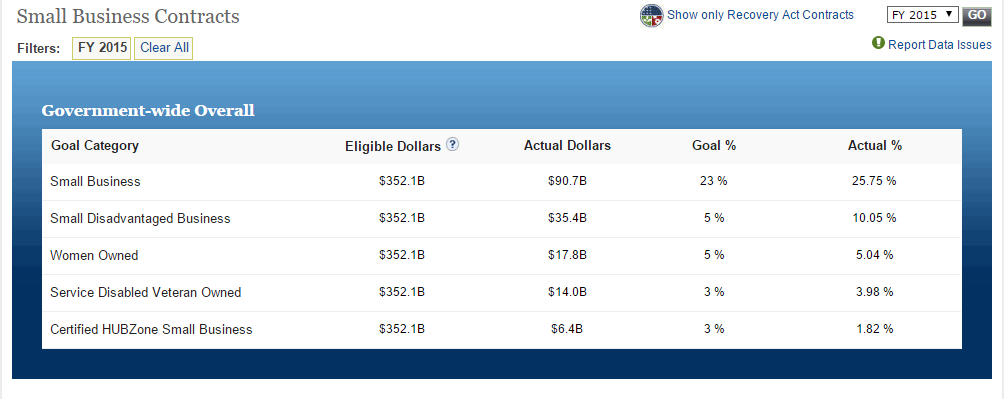Why You Should Market Yourself as a Government Subcontractor (Part 1)
Selling to the government can be lucrative, but the land of government contracting is ripe with competition. It can be a true challenge to win a bid as a prime contractor. There are other ways to break into government contracting or increase your revenue from government contracts that don’t involve you winning a bid as a prime.
Even if you tried and didn’t win the bid, the opportunity isn’t dead. The government’s goal for small business contracting is 23 percent. In order to meet that goal, prime contractors must often outsource work to small contractors when they can. That creates an opportunity for you to get involved or potentially work on the project.

Companies who want to be government contractors often spend their time trying to grow their contacts and focus their business development (BD) within agencies. This is what is called business to government marketing (B2G). Some government agencies, like the DoD, will even give you step by step instructions on how to market to them. However, it can take many years to build up those contacts and your credibility enough to win a bid.
There is another way, however. As mentioned at the beginning of the post, you can market your product, services, and expertise to other businesses that do business with the government, also known as business to business marketing (B2B). This may be a better option for you if you’re:
-
- New to government contracting
- Struggling with you B2G market and business development
- Have limited marketing and business development resources
- Want to grow your government contracting revenues faster
This is the first in a series of four posts that will explore the importance of marketing to and building relationships with other government contractors so that you can work as a subcontractor on lucrative projects. In this post, we’ll explore why you should consider subcontracting on government projects as a way to grow your own business.
Even if, as a government contractor, you’re considered a small business, working as a subcontractor on certain projects can provide you with an opportunity to work on much larger projects than you would otherwise qualify for: federal regulations require contractors who win bids valued over $500,000 and over $1 million for construction to have a plan to subcontract with small businesses, small disadvantaged businesses, women-owned small businesses, Historically Underutilized Business Zone (HUBZone) small businesses, and service-disabled veteran-owned small businesses.
If your business fits one of the above descriptions or if you are interested in working on larger contracts, keep reading. Here are a few reasons that subcontracting on government contracts is good for business:
You Fill a Need
Let’s say you lost out on an engineering bid for a government building that’s being constructed in your town. You’ve got a unique skillset that the job required, but the winning contractor doesn’t have anyone on staff that fits the bill. Or, perhaps you’ve worked with this particular government agency before, and know the ins and outs of the best ways to work with the staff. This could be a real boon to the contractor who won the bid.
With a little bit of marketing of your skills, you could easily fill that need in a way that no one else could. Consider what skills or experience you have that help you stand out. What unique qualification do you possess that makes you an asset to another government contractor? How can you help them find out about your skills? (Stay tuned for my next post will go more in-depth on how best to market your company.)
It Brings in More Business
It can be a challenge to win bids, especially if you’re relatively new to the government-contracting field. Long droughts between projects are stressful. Subcontracting allows you to get paid consistently and keep you busy with as much work as you can handle. Furthermore, since you are spending less time bidding on contracts, you’ll have more time to market your skills to contractors.
It’s Plain Good Networking
You could easily find yourself on the other side of this equation one day. When you win that future government bid, one (or more) of your competitors will be left out in the cold while you are looking for resources to fulfill the duties of your contract. Building relationships with contractors and seeing them as partners (rather than competition) allows you open the door to future opportunities – both as a contractor and as a subcontractor on government bids. It’s a win-win situation. In the scenario where you have won the bid, you won’t have to search far to find the talent that you need to make your project a success.
If you take nothing else from this article, remember not to wear blinders when it comes to how you get government projects. Being certified as a government contractor is just the first step to get your foot in the door. Working as a subcontractor helps you wedge that door open a little more. If an agency gets to know you as a subcontractor, the next time your bid lands on the decision maker’s desk, you’ll greatly improve your chances of being considered for the job.
Share your thoughts with us in the comments section below. How has subcontracting made a positive impact on your business?
Look for Part 2 next week – How to Market Yourself to Other Government Contractors
This post was originally posted as a guest post on Acuity Business blog.





